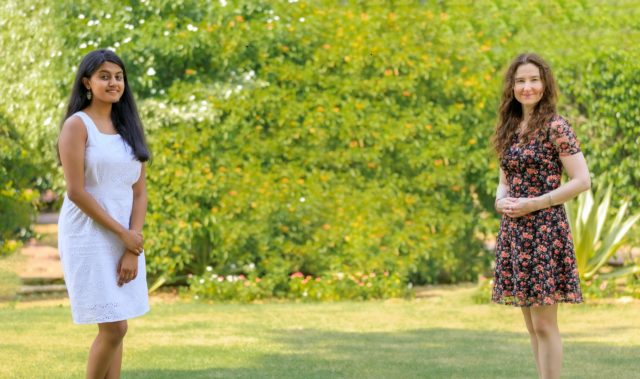This week, 18-year-old Chaitanya Venkateswaran from New Delhi had the unique opportunity to spend a day as the UK’s senior most diplomat in India. As top boss – overseeing the UK’s largest overseas network – Chaitanya’s busy day included handing out tasks to the High Commission’s department heads, interacting with senior female police officers, meeting the press, and launching a study tracing the impact of British Council STEM scholarships on Indian women participants.

Chaitanya is the 4th young woman to take over as British High Commissioner in an annual competition run by the UK mission, aiming to empower the next generation of women as leaders and trail-blazers, and to highlight some of the challenges women and girls around the world still face. The competition is run in celebration of International Day of the Girl Child (11 October).
Chaitanya Venkateswaran, High Commissioner for the Day, said: “I used to visit the British Council library in New Delhi when I was younger, and that’s where I cultivated my love of learning. Building on that knowledge, to be the British High Commissioner for a day was a golden opportunity. My day was full of diverse experiences which have really broadened my perspective on the role of women and their representation in fields of media, policing and STEM. I am now more determined than ever to use my new knowledge and experience to help promote equitable treatment of women everywhere.”
Jan Thompson, Deputy High Commissioner for the Day (on other days, Acting High Commissioner to India), said: “This competition is one of my favourite moments of the year – an opportunity to provide a platform to extraordinary young women, and show how the UK and India are sharing expertise to ensure women and girls reach their full potential around the world. I was thrilled to relinquish my duties to Chaitanya for the day and was impressed with how confidently and competently she took on this role, a deserving winner out of an incredible 215 entries. In the side-lines of her very busy day as High Commissioner, we also enjoyed discussing our mutual love of the arts. I look forward to seeing what Chaitanya achieves next, as she joins a cohort of young women whose voices we have been proud to amplify through this annual initiative; the next generation of global leaders.”
The British High Commission has run the ‘High Commissioner for a Day’ competition annually since 2017, inviting young Indian women aged 18 to 23 to take over as their most senior diplomat. This year, entrants were invited to submit a 1-minute video on social media, answering the question: ‘What global challenges and opportunities do you see for gender equality in the age of Covid-19?’
In line with Covid-19 health and safety precautions, Ms. Venkateswaran participated in the day via video conference, but was happy to meet Acting High Commissioner Jan Thompson at a later date for a socially distanced walk.
- Chaitanya Venkateswaran was High Commissioner for a Day on Wednesday, 7 October. Over the course of the day she: met with the Editor of Anandabazar Patrika to learn about gender representation in the media industry; discussed gender and policing with senior police officers from Madhya Pradesh and Telangana; interacted with the Marks & Spencer India team; launched the British Council STEM Tracer Study documenting the stories of 166 Indian women scholars; and chaired a meeting with youth leaders (including previous competition winners) on some of the biggest challenges facing the world.
- About the winner: Chaitanya Venkateswaran is an 18-year-old recent high-school graduate from New Delhi. She is pursuing a bachelor’s degree with a full scholarship in International Studies and Economics, and certificate programmes in Advanced Leadership Studies and Political Thought at American University, Washington DC, studying remotely. An active volunteer, she has worked to aid visually-impaired students, acid attack survivors and marginalised LGBT+ groups. She is also a trained classical dancer, an art enthusiast and avid reader. She aims to pursue a career in economics and global public policy. Ms. Venkateswaran’s winning entry was selected from a pool of over 200 submissions.
- UK and India gender equality work: The UK and India are working together to help ensure women and girls can reach their full potential. In India, the UK is working hand-in-hand with state governments, law enforcement agencies, education authorities and British businesses to promote gender equality. Examples of ongoing collaborative programmes include:
- Working with the Ministry of Rural Development to strengthen resilience to the impacts of climate change and promote livelihood security among women in rural communities, as part of the Mahatma Gandhi National Rural Employment Guarantee Scheme.
- Working with adolescent girls from socio-economically marginalised communities to develop their English, digital and leadership skills.
- Financial inclusion programmes focusing on financial and digital literacy, which have given 12 million Indian women access to credit to build livelihoods. Projects have helped set up or scale 10,000 women-owned micro businesses, created 6,000 jobs, and supported over 270 micro-entrepreneurs.
